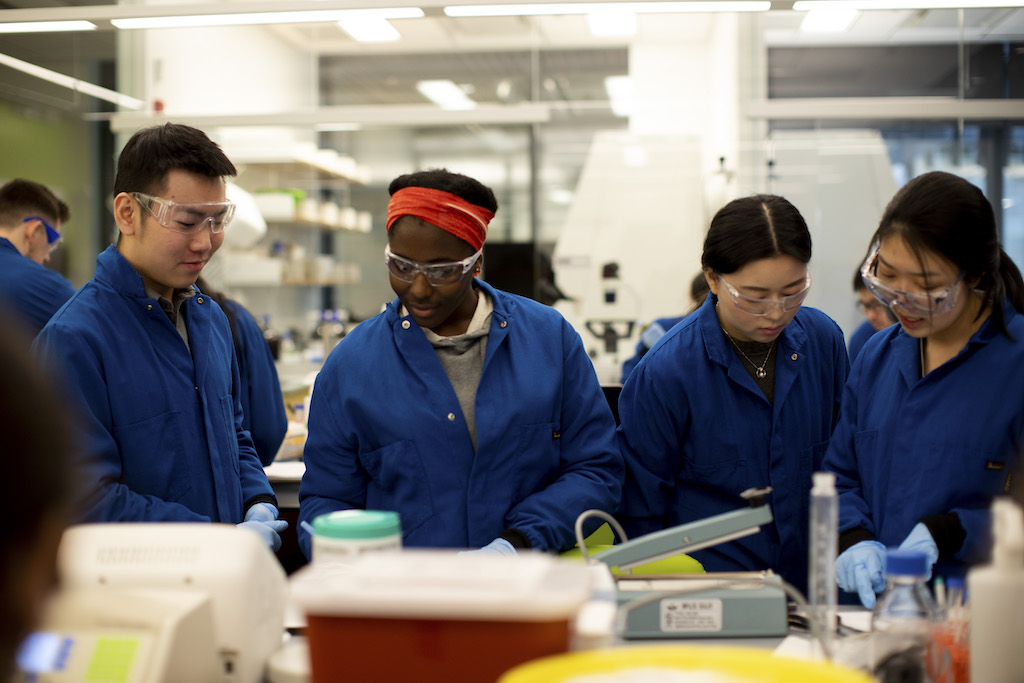Linde Foundation award will ease challenges faced by learners in the final year of their studies
Amid a national workforce shortage, Northeastern’s unique Biotech A2M Scholars Program, funded by the National Science Foundation (NSF), offers accelerated pathways for students from their associate to their master’s degree in biotechnology. The NSF grant supports students in the Biotech A2M program who start at Middlesex Community College in Bedford, MA, where they earn an associate degree with courses designed to map onto the Biotechnology bachelor’s degree at Northeastern. Students then go on to earn their MS in Biotechnology within the College of Science with one additional year of coursework. An additional philanthropic gift from the Herb and Maxine Jacobs Foundation offers tuition assistance during their master’s studies at the Northeastern University College of Science. These robust scholarships bring the out-of-pocket cost to zero for these learners with demonstrated financial need, and who are eligible for federal Pell grants.

Bridging the Gap
While the Biotech A2M program has been extraordinarily successful in terms of retention and graduation rates, evidence has emerged that learners face unique challenges in their final year of studies as they seek to finish their degree and start a career.
A new grant from the Linde Foundation is set to help these students connect with employers, bridging the gap between school and jobs. The Linde Foundation grant funds the new “Degree to Career” program, helping learners finish their degrees and transition to employment in their chosen fields while also teaching soft skills essential to career advancement. Additionally, the Linde Foundation provides scholarship support for students in their last year of study, ensuring learners are able to complete their degrees without the cost of tuition as a barrier.
“The A2M programs create accessible pathways to in-demand fields with high-paying jobs,” says Dr. Liz Zulick, Director of the Lowell Institute School and Associate Dean for Research, Innovation, Discovery and Entrepreneurship at Northeastern University College of Professional Studies. “This new grant will help biotech students stay on track in their crucial final year, supporting their transition from academia to industry.”
Path to a Career
The Biotech A2M is designed for full-time, domestic students, so far serving 154 learners. Over 66% identify as underrepresented minorities in STEM, 61% as first-generation learners and 66% as female. The average age is 29.
Zulick notes that many students must work full-time while attending classes and completing coursework online and at night. Nevertheless, the Biotech A2M program boasts impressively high rates of retention and job placement. While the retention rate nationally for a Bachelor of Science degree for STEM students is 56%, according to STEM Education Data and Trends 2014 the A2M degree pathway so far has retention rates that exceed 82% at all three degree levels. And 97% of those who have earned bachelor’s degrees are now working full-time in the biotech industry or have continued on to the next degree in the pathway.
Building on the success of the Biotech A2M program, the A2M4Tech program, with support from by the Akamai Foundation, was established in 2022 to serve the same function for students seeking careers in information technology and computer science.

More Than Degrees
“Education not only provides a pathway to high-paying jobs, but also provides access to social mobility to our learners and their communities,” Zulick says. “Thanks to the National Science Foundation, the Herb and Maxine Jacobs Foundation, the Akamai Foundation, and now the Linde Foundation, we can create pathways designed for adult learners and their needs, allowing those who otherwise might not be able to afford the cost or time investment of a degree to enter the biotech and tech sectors.”
Biotechnology manufacturing is a rapidly growing industry that offers excellent career growth, but the sector faces both a shortage of skilled employees and a lack of racial and social diversity. In light of these factors, Zulick points out, the program is also a boon to employers.
“Importantly, these pathways also offer industry partners a talent pipeline that is diverse in terms of race, ethnicity, and income,” Zulick says, “which is an increasingly high priority for many employers. So, these programs are truly win-win.”